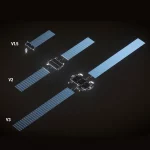Home » UK ISP News Archive » Daily Archives: July 12, 2022 (7 Posts Found)
Sponsored Links
You are viewing a July 12, 2022 news and article archive where older items are stored for readers to access and view. This is done to keep the systems running smoothly and prevents the front page from becoming too cluttered.
Search ISP News
Search ISP Listings
Search ISP Reviews
ISP News Archives for July 12, 2022
12th Jul 2022 (11 Comments)
The Connecting Devon and Somerset (CDS) project and UK ISP Airband have today issued a new July 2022 update on their Phase 2 contract to deploy a gigabit-capable Fibre-to-the-Premises (FTTP) broadband network across the region, which has so far covered 2,500 premises in hard to reach rural areas.
12th Jul 2022 (27 Comments)
Last week we reported that Three UK had cut the standard charge on their 5G unlimited Three Home Broadband packages and also introduced the more expensive ‘option‘ of a 1-month minimum contract term. But it seems they were a bit premature, since the new monthly term has only now gone live.
12th Jul 2022 (7 Comments)
The Broadband Forum has published a new standard that may help to tackle the issue of vendor lock-in on Fibre-to-the-Premises (FTTP) broadband ISP networks, which can result in the management cycle of optical modems (ONU / ONTs) being tied to a specific vendor’s Optical Line Terminal (OLT).
Advertisement
12th Jul 2022 (10 Comments)
The British Phonographic Industry (BPI) has announced that its long-running campaign, which uses the High Court to force major UK broadband ISPs into blocking websites that are suspected of facilitating copyright infringement (internet piracy), is being extended to mobile operators – starting with EE (BT).
12th Jul 2022 (15 Comments)
Broadband ISP Virgin Media UK (VMO2) has confirmed that they intend to continue to expand their gigabit-capable fixed line connectivity – via Fibre-to-the-Premises (FTTP) technology – to “tens of thousands more premises” across Northern Ireland over the coming years.
12th Jul 2022 (3 Comments)
Scottish broadband ISP GoFibre (BorderLink), which is partnered with wireless provider Marykirk.com (here), has today added two new locations in Fife to their ongoing rollout of a new 10Gbps capable Fibre-to-the-Premises (FTTP) network in Scotland.
Advertisement
12th Jul 2022 (5 Comments)
The idea of being able to offer consumers a 5G based mobile handset that gets its service from orbiting broadband satellites in Low Earth Orbit (LEO), as well as a terrestrial mast, is nothing new. But turning it into a commercial product is another thing entirely, yet Ericsson, Qualcomm and Thales appear to be making progress.
Cheapest Big ISPs for 100Mbps+
Community Fibre £19.00
100Mbps (100Mbps up)
Plusnet £22.99
145Mbps (30Mbps up)
Vodafone £23.00
150Mbps (27 - 150Mbps up)
Youfibre £23.99
150Mbps (150Mbps up)
Latest UK ISP News
Promotion
The Top 15 Category Tags
- FTTP (6769)
- BT (3873)
- Politics (3061)
- Business (2752)
- Openreach (2651)
- Building Digital UK (2504)
- Mobile Broadband (2460)
- FTTC (2139)
- Statistics (2118)
- 4G (2080)
- Virgin Media (2011)
- Ofcom Regulation (1773)
- 5G (1717)
- Fibre Optic (1597)
- Wireless Internet (1591)
New Forum Topics
By: ewanmclean2005
By: steve30
By: davegr
By: The Wee Bear
By: The Wee Bear
Promotion
Helpful ISP Guides and Tips
Latest Interviews
Sponsored
Copyright © 1999 to Present - ISPreview.co.uk - All Rights Reserved - Terms , Privacy and Cookie Policy , Links , Website Rules , Contact












































